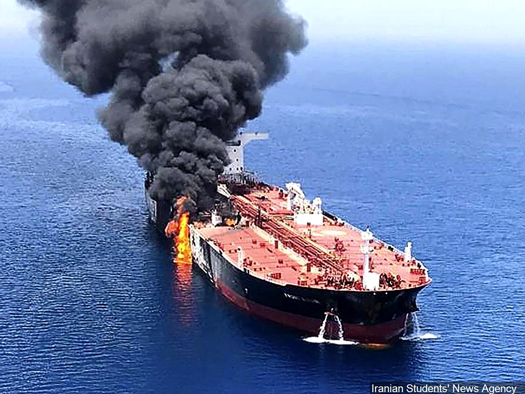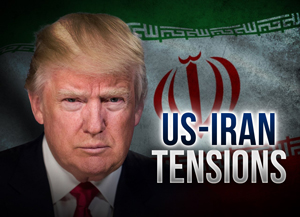FINALCALL.COM

The most recent saber rattling toward Iran from the United States is bringing the Middle East and the world closer to a war that no one should want and a war that could threaten the entire planet.
President Trump, backed by Secretary of State Mike Pompeo and National Security Advisor John Bolton, has accused Iran of bombing oil tankers in the Gulf of Oman.
While the president has sent conflicting signals at times about whether he wants to go to war or simply wants the Iranians to bow to America’s whims, he is playing a dangerous game.
As Vali R. Nasr noted in a June 17 New York Times opinion piece titled “Trump Might Not Want War With Iran. Without Diplomacy He Will Get One,” if the president is bluffing, a blunder may give him more than he bargained for. “The United States was quick to blame Iran for last week’s attack on two tankers in the Gulf of Oman. Iran has denied involvement, and there is considerable skepticism around the world about American claims. We don’t yet know what really happened, and may not for some time. But what the attacks and subsequent fallout show–regardless of who carried them out–is that President Trump’s policy of ‘maximum pressure,’ is not working,” warns Mr. Nasr.
“If Iran was behind the attacks, then American pressure has failed to bring it around for renewed talks and has instead prepared Iran for conflict. If the United States cannot provide clinching evidence of Iranian culpability, its eagerness to assign blame looks like a ruse to start a war.
“President Trump may not want war, but he will get one unless he balances coercion with diplomacy. He has discredited moderate voices in Tehran who had fought for the nuclear deal and the promise of engagement with the West. Iranian hard-liners, who distrust the West, want out of the nuclear deal and argue that only show of force deters Western aggression, are ascendant.
“Iranian leaders think that the United States has cheated Iran and walked away from the deal to strangulate Iran’s economy, break its state and force regime change. President Trump’s goal all along has been to negotiate a more stringent nuclear deal with Iran, scuttle its missile program and reduce its regional footprint,” wrote the scholar in Middle East politics and diplomacy and author of “The Shia Revival: How Conflicts Within Islam Will Shape the Future.”
Skepticism about the perpetrators of the June 13 bombing of the tankers is based on a long history of U.S. lies and fabricating military attacks. As Final Call senior editor Askia Muhammad notes in this edition, “In 1846 U.S. forces falsely claimed they were attacked by Mexican forces inside U.S. territory. In retaliation the U.S. launched the Mexican-American War, seizing land from New Mexico to California, to Colorado, even to Utah. Have we forgotten the suspicious sinking of the USS Maine, the Navy ship which went down in the Havana Harbor in 1898, dragging the U.S. into the Spanish-American War?

“In 1962, a Pentagon plan called ‘Operation Northwoods’ was hatched for the Central Intelligence Agency (CIA) to commit acts of terrorism against U.S. civilians to be blamed on Cuba, in order to justify an invasion of that country. In 1964 the White House committed ‘material misrepresentations’ of the truth of what was known as the ‘Gulf of Tonkin Incident’ in order to goad Congress into authorizing war with Vietnam. And of course the convincing dramatizations of ‘Yellow Cake Uranium’ and non-existent ‘weapons of mass destruction’ were used to justify the U.S. invasion of Iraq in 2003.”
With U.S. withdrawal from the historic Iran nuclear deal–the Joint Comprehensive Plan of Action–and imposition of stronger sanctions, America is backing Iran into a corner. The Islamic Republic has called on the European Union, which imports Iranian oil and has other ties to the country, to help find a solution to the problem to no avail. And with that Iran has reportedly enriched more uranium for peaceful purposes but the international accord under which the country has operated has been largely shattered.
Mr. Trump and his administration quickly blamed Iran for attacks on two oil tankers in the Gulf of Oman June 13, accusing the country of a second set of attacks on tankers in the region in recent months. Then, the U.S. released a video saying it shows Iran removing an unexploded mine from one of the tankers it’s accused of attacking.
The Japanese owner of the damaged ship told another story, saying the tanker was struck by “flying objects,” not mines. Yutaka Katada of Kokuka Sangyo said June 14 in Tokyo: “The crew are saying it was hit with a flying object. They say something came flying toward them, then there was an explosion, then there was a hole in the vessel. Then some crew witnessed a second shot.”
It also seems unlikely that Iran would attack Japanese vessels while it was hosting a top level Japanese official and U.S. allies are asking questions about the attacks on Japanese and Norwegian vessels. “A senior Japanese government official told Japan Today that ‘the U.S. explanation has not helped us go beyond speculation.’ German Foreign Minister Heiko Maas said Friday (June 14) that ‘the video is not enough.’ ‘We can understand what is being shown, sure, but to make a final assessment, this is not enough for me,’ Maas told reporters. Jeremy Corbyn, Britain’s opposition leader, said more ‘credible evidence’ was needed to support Trump’s allegation,” the HuffPost.com reported June 17.
So while America may be seeking to isolate Iran, she may be placing herself in a situation where she may find herself virtually friendless if war breaks out. The Honorable Minister Louis Farrakhan has consistently warned Mr. Trump and his predecessor presidents of the folly of going to war with Iran, how it could unleash the apocalyptic War of Armageddon spoken of in the Bible, and destroy America. He has also consistently called for Muslim nations to find a path to reconciliation and not fall into deeper conflict at the instigation and manipulation of the United States. His message and his warnings have been consistent. We should pray they have not been in vain.












